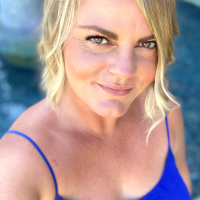View this post on Instagram
“Buddhists don’t trust.”
That’s how I interpreted the message of my boss some time ago, while talking on a personal level about my stubborn relationship trust issues. He clarified, but my mind was so used to the black-and-white of either complete trust or complete distrust that the heady medium of foglike gray he’d provided didn’t connect.
Ether way, not trusting in any capacity—a lack of faith—seemed to me rather sad and hopeless. Cynical. But it also made sense in my mind:
Trust leads to expectation, which leads to a supposition that some things remain static and unchanging, which leads to disappointment because, at some point in time, everything changes.
That’s the process of attachment.
I never looked for more understanding of what my boss had said. I had no need, I thought. That was, until this morning.
I woke up today and refreshed my phone screen. Biden: 290.
I gently rolled myself out of bed and grinned at the soft, sporadic melody of “woots” as they chirped like birdsong throughout my apartment complex, filtered through the shadow of tropical plants just outside of my bedroom window, and drifted in through my louvered slats.
I smiled, but I did not take comfort. I immediately began reading news stories.
Of course, President Trump is not backing down. Of course, my family is probably rejoicing in this resistance. And of course, as is the trend in my life, I am unable to trust—in these results, the media, the people of our country.
And you know what?
That’s perfectly okay.
To trust wholeheartedly in the result of this election felt foolish, shallow, misinformed, unsteady. My trust, when for brief moments I chose to engage in it, felt blind. The words of my boss that I’d half taken in sprung back to mind. It was time, now, to dive into that foggy gray I’d been resisting.
For the past several days, I’ve been looking for answers—we’ve all been looking for answers. Who’s winning? Will he concede? Is there or isn’t there fraud? How can we be so very divided?
But, according to Shinge Roko Sherry Chayat Roshi, “answers shut us down; they shut down our inquiring spirit.” And right now—anytime, really—that can’t be a good thing, now can it?
“In order to get through our complicated, demanding, challenging lives,” she says, “we feel we need to find solutions to our problems; we’ve been taught that problems must be solved.”
In the Lion’s Roar article that explores this concept, Roshi looks at the complications of faith and, in doing so, delves also into trust. We are led to the question, “Trust in what?” And that question leads to the answer, “This.”
But then what is the this that we trust in?
Can we really trust this: media to set aside its bias (and that of those funding networks and publications)?
Can we really trust in this: statistics that can be creatively skewed to show (almost) anything we wish when that data is presented in visually and verbally manipulative ways?
Can we really trust in this: our politicians (any of them) to not become power-hungry, or to not give in to corporations, or to not act only in ways that please those who think like them when they ought to find the middle ground solutions that unify the multiple threads of thought within our nations?
I’d argue no. But we can trust in ourselves.
“To have confidence in ourselves is to have confidence in this. This is trust. No matter what we can possibly do in this short and fleeting life, without trust we are stuck being the traffic cop, trying to make everything go our way, according to our one-sided and self-deluded views.” ~ Shinge Roko Sherry Chayat Roshi
We need to trust in ourselves. And then we need to take that further.
We need to, as Roshi says, “drop the compulsion to categorize that comes from suspicious mind: the anxiety-burdened, opinion-encrusted mind that refuses to trust in what the present moment brings, just as it is.”
Anxiety-burdened. Opinion-entrusted. Refusal to trust in what the present moment brings. Sound familiar?
Roshi goes on to explain the difference between suspicion and doubt, where suspicion is the “unexamined assumption that everything can be understood and explained if we just find the right diagrams…and keep narrowing things down…”
The truth, Roshi says, is that the deeper we delve into any area of study, the more we come to realize we don’t know.
“So many problems occur because we have some limited view of how things should be, of what we need, of what practice is. But this looking for what we need keeps us from receiving what is always being given.” ~ Shinge Roko Sherry Chayat Roshi
Basically, while we do not trust others or, as my boss said, “engage in blind faith,” we also do not distrust. We balance. We find the magic in between. The now. And in that now, we do the work.
And so I will trust the feeling of comfort that I am experiencing as a result of learning that, for now, the president-elect is one that I voted for.
I will also trust the feeling of uncertainty that comes with that comfort, and I will trust the knowledge that this comfort is fleeting and surely will change in some way, shape, or form.
And while I cannot politically trust in Trump, or in my family, or even in you, who may be different- or like-minded, I can trust in myself to continue to move in ways that I consider to be of benefit to myself and to the world.
Can I trust that you might do the same?
“If you strive for something, if you try to become Buddha, you push that unformulated realm away. Just effort. Just deep motivation for the happiness of all beings. Just liberative intention.” ~ Shinge Roko Sherry Chayat Roshi
~










Read 10 comments and reply